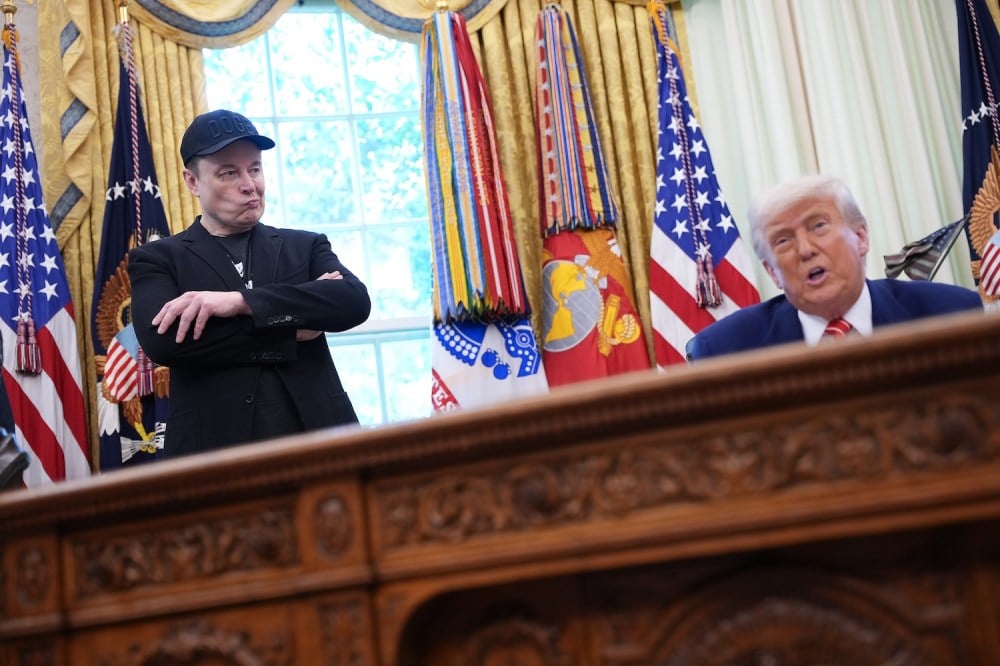The widely predicted breakup of Elon Musk and U.S. President Donald Trump has finally and inevitably come to pass. Having recently departed his role as de facto head of the Department of Government Efficiency (DOGE), the tech billionaire began to criticize Trump’s subsidy-filled budget bill, kicking off a war of words on social media and a resulting political firestorm.
What follows is likely to be a messy and vengeful separation that will do damage to the reputations of both men and the United States as a whole. But ultimately, this will be a lopsided fight in which the billionaire and his business empire, not Trump’s administration, will suffer most.
Musk is about to learn a broader lesson that extends far beyond U.S. politics. Corporate interests often wield unhealthy and outsized influence in global autocracies. Yet from China under President Xi Jinping, to Russia under President Vladimir Putin, to India under Prime Minister Narendra Modi, a common pattern emerges: When business titans and political leaders fall out, it is the former who lose. Put another way, Musk has just picked a fight that he almost certainly cannot win.
At the start of the year, I argued in Foreign Policy that speculation about a likely split between Trump and Musk missed a wider point about what they might achieve by working together. In the end, their partnership lasted longer and had greater influence than many detractors predicted.
The vandalism that DOGE meted out to the U.S. Agency for International Development alone would have been enough to cement Musk’s dubious legacy in the annals of government reform. More troubling—even in his relatively brief tenure—was the alarming precedent that he set by undermining the basic functions of many U.S. institutions, sending teams into government departments, almost certainly illegally, without appropriate oversight.
Musk’s actions during his time in government reflected a brand of tech-bro Maoism, in which existing institutions are viewed as so fundamentally inefficient and corrupted that regular reform is impossible; only purging and rebuilding can work, echoing Chinese leader Mao Zedong’s concept of “continuous revolution.” Much like the early stages of the Cultural Revolution, the Musk upheaval was often led by youthful zealots, delivering reforms that were designed largely to remove ideological resistance to Trump rather than anything resembling actual government efficiency.
In the long run, though, a messy divorce seemed inevitable between two men afflicted by near-megalomania—a state characterized by fantasies of power and omnipotence. Such delusions are not uncommon among the global billionaire class, of course. But it is at least worth pondering how this unedifying spectacle will appear when viewed from Beijing, Moscow, or Riyadh.
Most likely, the Trump-Musk split will reinforce the conviction among global authoritarians that business elites must be kept tightly under state control. Seen this way, Trump’s error was not bickering with Musk but rather handing him a prominent and powerful role as a “special government employee” in the first place.
Trump has long expressed admiration for Xi, but in allowing Musk to get so close to power, the U.S. president certainly failed to learn from the Chinese leader’s handling of tech mogul Jack Ma. In 2020, Xi moved brutally and swiftly against the Alibaba founder after he dared to criticize Chinese financial regulators, canceling his Ant Group’s $37 billion initial public offering and effectively ending Ma’s public influence.
Other global autocrats follow similar anti-tycoon patterns. In Putin’s Russia, the birthplace of modern oligarchic capitalism, moguls are deeply deferential to state power—and understandably so, given the fate of those who dare to challenge the Kremlin. Jailed or exiled billionaires, such as Boris Berezovsky and Mikhail Khodorkovsky, serve as permanent reminders of the costs of defiance.
In India, the so-called Bollygarch class has grown enormously in power in recent years, embodied by figures such as Gautam Adani and Mukesh Ambani—now the two richest people in Asia. Yet both remain meekly supportive of Modi and his government, careful never to go anywhere close to the lines that might invite state retribution.
Perhaps no leader has been more brutal in establishing this hierarchy than Trump’s new best friend in the Middle East, Saudi Crown Prince Mohammed bin Salman. Rather than invite Saudi Arabia’s commercial titans into the government, Mohammed bin Salman detained hundreds of princes and businessmen in 2017 at Riyadh’s luxurious Ritz-Carlton hotel, releasing them months later, after they handed over billions in cash in exchange for their freedom.
None of this is to imply that modern billionaires lack influence. In the United States, wealthy individuals and corporations find many avenues to power. Financial clout can be used to support political candidates, shape legislation, and fund pet causes. But in general, wiser magnates play a longer, quieter, and more deferential game than Musk showed in his grab for direct governmental power.
There is a sliver of an upside to this egoistic and bad-tempered spat brewing between Trump and Musk. After all, countries like the United States that remain nominally democratic should be run by elected political leaders, not out-of-control corporate titans. But the truth is that Musk’s downfall will now most likely produce a host of more troubling consequences.
A vindictive president has many tools at their disposal, including regulation and targeted tax investigations, the removal of government subsidies, and the cancellation of government contracts. From Jamie Dimon of JPMorgan Chase to Tim Cook of Apple, U.S. chief executives will draw stark conclusions from Musk’s treatment. Corporate leaders generally prefer stable institutions and the rule of law. But in the absence of that, the message is clear: show deference to Trump, keep your head down, and kiss the ring.
In that sense, the split with Musk will likely suit Trump just fine. The ratings will be spectacular, and he has most of the best cards to play. The outcome also helps to “encourage the others,” as writer and philosopher Voltaire might have put it, underlining the costs of challenging presidential authority with the most prominent scalp of all. Just as Xi humbled Ma, Trump’s coming assault on Musk’s business empire will show that concentrated, unaccountable political power ultimately triumphs over concentrated, unaccountable economic power.
The U.S. left often warns about corporate capture of the government, in which politicians serve as puppets to shadowy oligarchs. But the lesson from global autocracies shows the true danger flows in the opposite direction. When democratic institutions weaken, political leaders don’t become subordinate to business elites—they subordinate businesses to themselves.
Musk is about to discover what his peers in Beijing, Moscow, and New Delhi learned long ago: When oligarchs and political power come to blows, political power trumps economic might every time.
The post Elon Musk Just Picked a Fight He Cannot Win appeared first on Foreign Policy.




